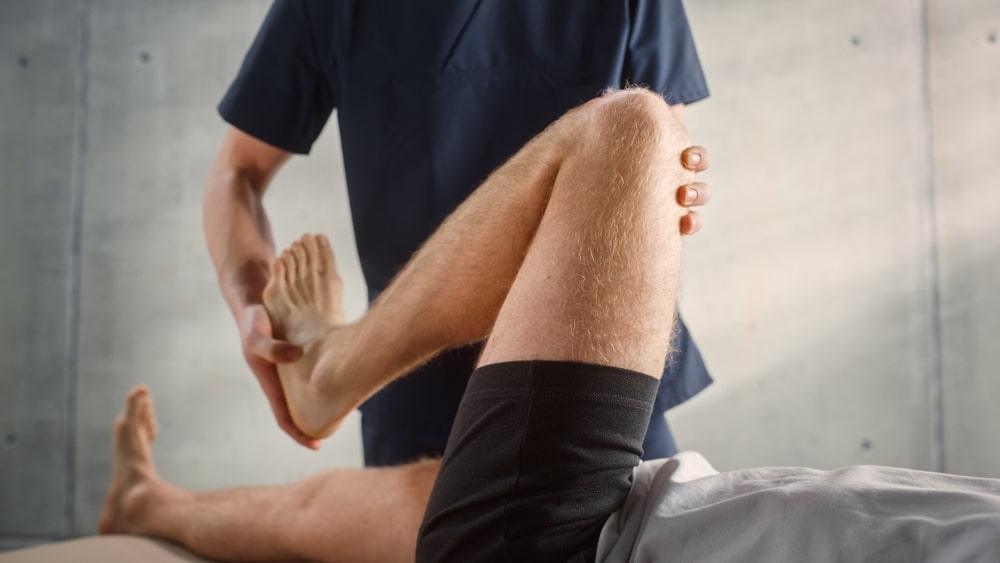Achilles Tendonitis is a condition that affects the Achilles tendon, the band of tissue connecting the calf muscles to the heel bone. It can cause significant pain and limit one's ability to walk, run, or engage in daily activities.
Understanding Achilles Tendonitis and knowing where to seek expert treatment is imperative for residents of Ogden, UT, to maintain an active and healthy lifestyle. Utah Orthopaedics is the region's only comprehensive, single-office provider of high-quality orthopaedic services. Our board-certified orthopaedic surgeons diagnose and treat a wide range of orthopaedic conditions in teens and adults, emphasizing conservative treatments before considering surgery.
What is Achilles Tendonitis?
Achilles Tendonitis occurs when the Achilles tendon is inflamed, typically caused by overuse or sudden increases in physical activity. The Achilles tendon is important as it is the strongest and largest tendon in the body, playing a vital role in physical activity.

Causes of Achilles Tendonitis
Several factors can contribute to the development of Achilles Tendonitis:
- Overuse: Repetitive stress on the tendon from activities such as running, jumping, or dancing can lead to inflammation.
- Sudden Increase in Activity: Rapidly increasing the intensity or duration of physical activity without proper conditioning can strain the tendon.
- Improper Footwear: Shoes not providing decent foot support or cushioning can increase the risk of Achilles Tendonitis.
- Age: Tendons naturally weaken and become less flexible, making them more susceptible to injury.
- Existing Health Conditions: Conditions such as obesity or flat feet can place additional stress on the Achilles tendon.
Symptoms of Achilles Tendonitis
Symptoms can range from mild to severe and may include:
- Pain: Aching or burning pain in the back of the heel, particularly when engaging in physical activity or afterward
- Swelling: The affected area swells or feels tender
- Stiffness: Stiffness and limited range of motion in the ankle, particularly in the morning or after periods of rest
- Thickening of the Tendon: In chronic cases, the tendon may become thickened and develop nodules
Early diagnosis and treatment are necessary to prevent this condition from worsening and to promote a faster recovery.
Diagnosis of Achilles Tendonitis
At Utah Orthopaedics, our experienced specialists use a comprehensive approach to diagnose Achilles Tendonitis, which may include:
- Physical Examination: We assess the range of motion, strength, and tenderness in the affected area
- Imaging Tests: Ultrasound or MRI scans to visualize the extent of the inflammation and to rule out other potential issues
Accurate diagnosis is the first step toward seeking treatment and recovery.
Treatment Options for Achilles Tendonitis
Several treatment options are available for Achilles Tendonitis, depending on the severity of the condition:
- Conservative Treatments: Rest, ice, and nonsteroidal anti-inflammatory drugs (NSAIDs) can help reduce pain and inflammation. Physical therapy exercises can strengthen the calf muscles and improve flexibility.
- Orthotics: Custom orthotic devices can provide additional support and reduce strain on the Achilles tendon.
- Extracorporeal Shockwave Therapy (ESWT): This non-invasive treatment uses shockwaves to stimulate healing in the tendon.
- Surgical Intervention: In severe or chronic cases, surgery may be required to repair the damaged tendon.
At Utah Orthopaedics, we create personalized treatment plans tailored to each patient's needs, ensuring the best possible outcomes.
Preventing Achilles Tendonitis
Preventing Achilles Tendonitis involves adopting healthy habits and making mindful choices:
- Proper Warm-Ups: Always warm up before physical activity to prepare your muscles and tendons.
- Stretching: Stretch your calf muscles and Achilles tendon often to maintain flexibility.
- Gradual Increases: Slowly increase the intensity and duration of physical activities to avoid overloading the tendon.
- Supportive Footwear: Wear shoes designed to provide support and cushioning for specific activities.
Take proactive steps to significantly reduce the risk of developing Achilles Tendonitis.
Why Choose Utah Orthopaedics?
Utah Orthopaedics utilizes advanced diagnostic technologies to determine the underlying causes of chronic back, foot, and ankle pain. Our clinic is fully equipped with state-of-the-art diagnostic imaging, allowing us to accurately diagnose and treat various orthopaedic injuries and conditions.
Dr. Jeffrey Rocco, MD, a board-certified orthopaedic surgeon, provides non-operative treatments and minimally invasive surgical techniques to ensure optimal patient outcomes.
Our team includes licensed physical therapists, sports medicine specialists, and physician assistant Alexandra Rocco, PA-C, who collaborates to deliver comprehensive, patient-centered care. At Utah Orthopaedics, we are committed to providing the highest-quality orthopaedic services in the region.
Frequently Asked Questions (FAQs)
What is the difference between Achilles Tendonitis and Achilles Tendonosis?
Achilles Tendonitis means the Achilles tendon is inflammed, often due to overuse. Achilles Tendonosis is a chronic condition involving degeneration of the tendon tissue.
How long does it take to recover from Achilles Tendonitis?
Recovery time varies with each case, depending on the severity of the condition and the treatment plan. It can range from a few weeks to several months.
Can Achilles Tendonitis be treated without surgery?
Yes, many cases of Achilles Tendonitis can be effectively treated with conservative methods such as rest, physical therapy, and anti-inflammatory medications.
What should I do if I suspect I have Achilles Tendonitis?
If you suspect you have Achilles Tendonitis, it is important to seek medical advice promptly. Early diagnosis and treatment are necessary to prevent further injury and speed up recovery.
Get Relief from Achilles Tendonitis in Ogden, UT
If you're experiencing symptoms of Achilles Tendonitis, don't wait for the pain to worsen. Schedule a consultation at Utah Orthopaedics today. Our team of experts is highly focused on providing comprehensive care and helping you return to your active lifestyle. Contact us at (801) 917-8000 to book your appointment today.
